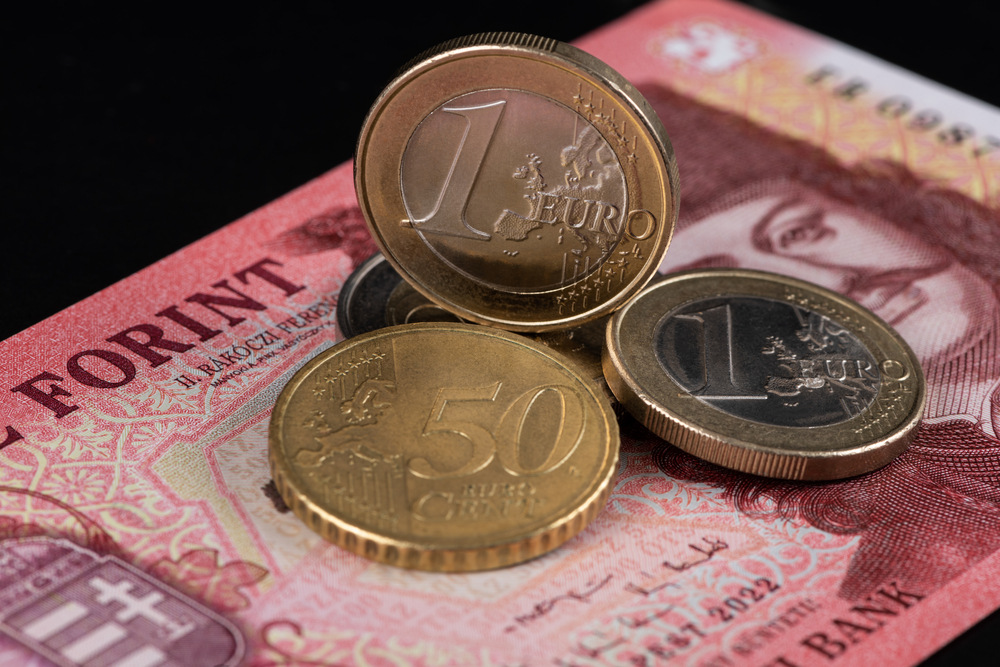Change language:
Bleak forecast: EUR/HUF exchange rate to remain around 400

The EUR/HUF exchange rate is expected to hover around 400 in the near future, according to financial experts. They believe a major depreciation of the forint is unlikely unless unforeseen external factors arise. Conversely, this also means that the Hungarian currency is not expected to strengthen significantly: the price of one euro will likely remain between HUF 380-400.
As reported by DNH at the end of this May, the forint has performed particularly well in recent weeks, trading at 383.95 against the euro and 353.72 against the dollar. Now, despite the promising figures, the forint has started to weaken in recent days.
Pénzcentrum spoke to several financial experts about the future of the forint ahead of the vacation season. They anticipate no major fluctuations in the EUR/HUF exchange rate, suggesting it will likely stay within the 380-400 range.
After weeks of strengthening, the forint has lost momentum
Following a period of remarkable gains, on Wednesday morning, the forint traded at 390 against the euro, and 403 against the Swiss franc once again. A relative weakening was also seen against the dollar, albeit to a lesser degree, with the USD/HUF exchange rate currently hovering around 360.
According to Pénzcentrum, in the case of the Swiss franc, it is not the fluctuations of the forint itself, but the sustained strength of the Swiss currency that explains the sudden rise in its price.
János Nagy, an analyst at Erste, describes the forint’s recent fluctuations as a natural and typical process for the Hungarian currency.
We do not think the movements we have seen in the forint in recent days are out of the ordinary; they are completely in line with the usual pattern. There was no specific factor behind last week’s weakening, just as there was no particular factor behind the earlier strengthening. The forint continues to react intensely to movements in the EUR and USD, where there has also been no clear trend for months,” the expert told Pénzcentrum.
Expectations regarding the Hungarian National Bank’s interest rate policy, as well as those of other major central banks such as the Fed and ECB, also impact the forint, he emphasised.

It is time to get used to the 380-400 EUR/HUF exchange rate
According to András Bukovszki, an analyst at CIB Bank,
“Our expectations for the forint remain unchanged. The EUR/HUF exchange rate will likely continue to fluctuate in the 380-400 range.”
János Nagy shares a similar view, stressing that he does not expect a rapid weakening of the Hungarian currency. He adds that even if the forint does weaken quickly, the Hungarian central bank may adopt a more cautious interest rate policy, which will support the currency.
“Of course, this does not exclude the possibility of periods of high volatility when we see larger swings for either external or internal reasons. It also follows from the above that exactly when the forint is strongest in a given period, i.e., when it is most advantageous to exchange, will always become clear only in hindsight.”
Similarly, Bukovszki emphasised that unforeseen (positive or negative) events can cause significant fluctuations in the EUR/HUF exchange rate, as “the forint remains the most sensitive in the region to changes in international investor sentiment.”
In any case, analysts generally do not expect the forint to experience any sudden ups or downs, which also means that it will not make any outstanding gains shortly—unless some significant external change occurs.
As for exchanging money ahead of holidays, János Nagy added that those who pay by card instead of cash can offset several forints of weakening, as credit cards usually offer a cheaper currency conversion rate than cash exchangers. Therefore, those travelling abroad may be better off paying by debit card instead of exchanging money before travelling.
Read also:
- Possible 400 EUR/HUF exchange rate amid Hungarian central bank decisions
- Surprising: German companies push for euro in Hungary – will PM Orbán introduce it?
Source: Pénzcentrum








Application of Financial & Economic rationality, answers can not be FOUND, to argue, put a case forward, that could give factual reason(s) – why the forint remains in a growing PRESSURIZED “zone” – that will sooner than later, send it into further de-valuation against the Euro and ALL other major world currency’s.